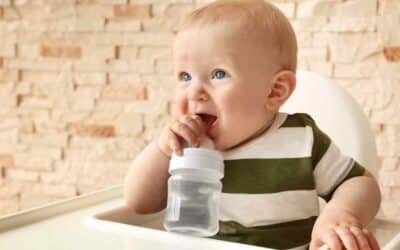For many parents, knowing how to properly store your baby’s liquid concentrate and powdered baby formula is crucial to your baby’s health. But with so many formulas to choose from and various factors affecting storage, knowing which practices can help keep your baby’s powdered formula products fresh and safe for an extended period is a challenge.
If you’re one of the many parents who worry about preparing infant formula for their babies, don’t fret. We will discuss a few essential tips to help you store formula for your baby. We’ll also cover everything you need to know to maintain the quality and safety of your baby’s formula.
We offer a comprehensive guide to help you keep your baby’s formula fresh and safe. From understanding the types of formulas to the best practices for storage to common mistakes to avoid– rest assured that we’ve got you covered. Read further to learn more.

What Are the Different Types of Infant Formula?
Many experts will agree that breast milk is still the best source of nutrition for most babies. However, not every parent can or prefer to breastfeed their children. Fortunately, powdered formula products are a practical alternative to breast milk.
Infant formula has the necessary nutrients for your baby’s growth and development. There are various types of infant formula available for formula feeding. Let’s discuss a few of them to help you make the right choice.
Cow Milk Protein-Based Formulas
Almost every infant formula made with cow’s milk has been altered to resemble the proteins found in breast milk. A typical powdered infant formula has the right nutrient balance, making it easier to digest. Almost all babies do well with every type of powdered infant formula. However, there are some instances when a baby may develop allergies to the proteins found in cow’s milk, so other parents prefer another ready-to-feed formula.
Soy-based Formulas
Soy-based formula products are an excellent alternative for babies allergic to cow’s milk powdered formula. However, there are also instances when babies allergic to cow’s milk may also be allergic to soy-based ready-to-feed formula.
Protein Hydrolysate Formulas
For babies who are allergic to both soy-based formula and cow’s milk, another option to consider is a protein hydrolysate formula. These formula types have broken down proteins that are either partially or extensively hydrolyzed to ensure that babies can easily digest them. For babies who can’t tolerate soy-based or cow’s milk proteins, extensively hydrolyzed formulas is an excellent choice

How to Choose Infant Formula
The Centers for Disease Control and Prevention says that there aren’t any specific types of infant formula products that can claim to be the best for all babies. That’s why choosing a product that’ll suit your baby’s specific needs is essential.
The US Food and Drug Administration carefully regulates every baby formula, including liquid concentrate formula and powder formula, to ensure they meet the minimum safety and nutritional requirements [2]. But how do you choose the best-prepared formula for your baby?
Age
One of the first things you must consider is your baby’s age. Remember that your baby’s nutritional needs change based on its current stage of development. That’s why it’s essential to choose an infant formula designed to meet your baby’s needs based on age to ensure they’re getting the right nutrients.
Nutritional Needs
Another factor that you need to consider is your baby’s nutritional needs. An infant formula has to have the right balance of fats, proteins, and carbohydrates to ensure optimum growth. When choosing a baby formula, it’s best to look at the nutritional content printed on the label and check if it meets your baby’s needs. Remember that there are particular baby formula products designed to provide specific nutrients, such as DHA or iron, which are crucial for your baby’s brain development.
Protein Choice
Choosing the right protein in the powdered formula when feeding your baby is also essential. As previously discussed, there are instances when a baby has allergies to specific ingredients. That’s why it’s essential to choose a liquid concentrate formula that will suit your baby’s needs without triggering any allergic reaction when feeding your baby [3].
Cost
Not every formula product has the same price. So, while infant formulas meet the same nutritional value, there are instances when some brands may be more expensive compared to others. So, it’s best to consider your budget when choosing a prepared formula.
Convenience
Some infant formulas are more convenient than others. Ready-to-use formulas are the most suitable, as they do not require any preparation. Powdered formulas are more affordable but require preparation. Liquid concentrate formulas fall somewhere in between.

Essential Tips When Preparing Formula
Many new parents often find preparing formula a daunting task that they need to face daily. Fortunately, it doesn’t always have to be the same grueling experience every time. Here are a few ways to help make the entire formula feeding process much easier to ensure that you’re preparing ready-to-feed formula safely and correctly.
Read the Instructions
When preparing your baby’s formula, it’s essential to follow the instructions printed on the formula container. Remmeber that every type of formula has its unique set of instructions for preparation. So, it’s vital that you follow the instructions carefully to ensure that you get the most out of it. For instance, some formula powder products require mixing with warm water, while others don’t require any at all. Neglecting to follow the instructions can adversely affect the nutritional content and safety of the formula.
Sterilize Bottles and Other Equipment
Besides sterilizing the baby bottle, it’s equally important to sterilize other pieces of equipment such as the nipples and other utensils used to prepare baby formula. You also need to wash your hands thoroughly to prevent any potential contamination in the baby bottle.
Only Use the Right Amount of Formula and Water
It’s always best to use the correct amount for formula and water to ensure that you’re baby gets the right amount of nutrients. Adding too much or too little concentrated liquid formula might lead to malnutrition or even digestive issues. So, besides reading the instructions, you need to ensure that you’re measuring the water and formula accurately.
Check the Temperature
It’s highly advisable to check the temperature of the formula to prevent it from burning your baby’s mouth. Before giving your baby infant formula, it’s best to put a few drops of concentrated liquid formula o your wrist to check the temperature. This method is highly advisable, especially if your baby prefers warm formula.
Get Rid of Any Leftover Formula
It’s highly advisable to discard any type of formula that’s been sitting out for more than an hour. Bacteria can grow in the left over formula when exposed to the outside temperature for long. Thus, making it unsafe for your baby to consume, especially if they have a weakened immune system.

Common Mistakes to Avoid When Storing Baby Formula
Proper storage is an essential part of infant formula preparation. Storing it incorrectly can affect its nutritional value and safety. Thus, potentially putting formula-fed babies at risk of disease. Let’s discuss a few of the most cowsmmon mistakes when it comes to storing baby formula container so that you can avoid them:
Not Following the Expiration Date
All types of consumable products have an expiration date, even your baby’s formula. So, it’s best to check the expiration date before buying and using the formula. Using expired formula won’t help your baby get enough nutrients, which may pose a health risk to your baby.
Neglecting to Store Formula at the Right Temperature
You should store a formula at the correct temperature to maintain its nutritional value and safety. The ideal temperature for storing the formula is between 35°F to 75°F. Storing formula in extreme temperatures can cause spoilage, affecting the quality and safety of the formula.
Using the Formula Outside the Recommended Time Frame
You should use prepared formula within one hour of preparation. Leaving formula out too long can cause bacterial growth, potentially harming your baby. If you need to prepare the formula in advance, storing it in the refrigerator and using it within 24 hours is essential.

Conclusion
Proper formula storage is essential to ensure your baby’s safety and nutritional needs. By following these guidelines, parents can be confident that their baby’s formula is safe and fresh as it provides the necessary nutrients for their growth and development.
Remember to always consult with your pediatrician and carefully read the instructions on the formula package. With the proper knowledge and preparation, parents can provide the best possible nutrition for their babies.
If you have a question or concern, please feel free to ask. Your comment is welcome below.



